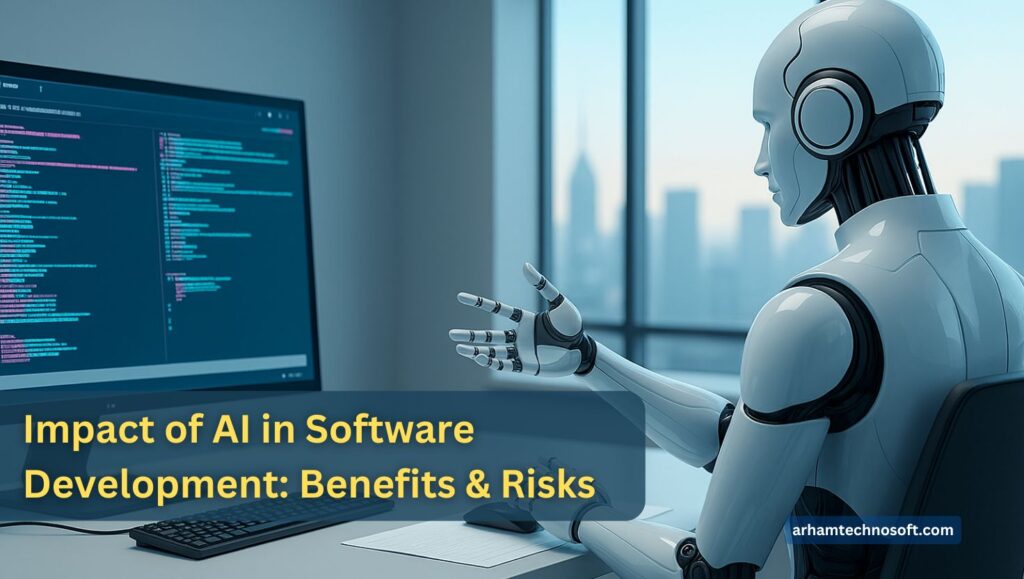Artificial Intelligence (AI) is revolutionizing businesses across the globe and software development is no exception to it. Right from coding to bug detection and anticipating user demands, AI in software development is not a passing trend it’s turning into a norm.
In this article, we’ll explore how AI is revolutionizing software development positively, the advantages of AI-driven software development, and the dangers we need to manage. Whether you’re a developer, business owner, or technology enthusiast, an understanding of AI’s role can help you prepare for digital innovation’s future.
What Does AI in Software Development Really Mean?
AI in software development refers to the use of intelligent algorithms, machine learning (ML), and data-driven models to assist or automate parts of the software lifecycle. This includes everything from planning and design to coding, testing, and maintenance.
AI tools can:
- Write code snippets or entire functions
- Detect bugs and security flaws automatically
- Suggest design improvements
- Predict future issues based on past data
- Help with better decision-making using analytics
Instead of replacing developers, AI is designed to enhance their productivity and reduce repetitive tasks. This allows teams to focus on solving creative and complex problems.
Key Benefits of AI in Software Development
Let’s look at the top benefits of AI in software development that are already improving how we build and manage digital solutions.
1. Faster Development Cycles
AI tools can automate tasks like writing boilerplate code, generating unit tests, or suggesting code completions. This can significantly speed up development, especially for startups or businesses trying to launch products quickly.
2. Fewer Bugs and Better Code Quality
Machine learning models trained on massive datasets can identify bugs and performance issues in real time. This leads to more secure, stable, and high-performing software.
3. Smarter Testing
Automated testing powered by AI can simulate user interactions, find edge cases, and run thousands of test scenarios quickly. This reduces the time needed for manual testing and improves test coverage.
4. Data-Driven Decision Making
AI can analyze user behavior, system performance, and past issues to help developers and product managers make better decisions. For example, AI might suggest which features users find most valuable guiding your next update.
5. Enhanced Personalization
AI models can create highly personalized user experiences by analyzing preferences and usage patterns. This is especially useful in AI in web development, where UX/UI decisions directly impact customer satisfaction and conversions.
Where AI Is Already Making a Difference
Across the software industry, AI is being used in many practical ways. Here are some examples:
- Code generation: Tools like GitHub Copilot help developers by suggesting lines of code as they type.
- Bug detection: Static analysis tools powered by AI find errors that human reviewers might miss.
- Web development: AI can recommend layouts, suggest color schemes, or even write front-end code based on wireframes.
- Project management: AI-powered tools forecast project timelines and identify bottlenecks before they become problems.
Whether it’s improving workflows or enhancing user experiences, the impact of AI in software development is deep and wide.
AI in Web Development: Smarter Interfaces, Faster Launches
AI is also changing how websites and web apps are built. Traditional web development required manual coding, testing, and design a process that could take weeks or months. With AI, much of that work can now be automated.
Here’s how AI in web development is making a difference:
- Design assistance: Tools like Wix ADI or Bookmark use AI to create web layouts instantly based on your input.
- Chatbots and automation: AI-powered chat tools improve customer support and engagement.
- Content optimization: AI suggests SEO-friendly content and layout changes to improve site rankings.
- Accessibility enhancements: AI can help websites meet accessibility standards by auto-generating alt texts, captions, and color contrast checks.
The result? Websites that are easier to build, smarter in performance, and more personalized for each user.
Risks of AI in Software Development: What We Must Watch
While AI offers many advantages, it’s not without challenges. Let’s examine some common risks of AI in software development that developers and businesses need to be aware of.
1. Over-Reliance on AI Tools
Depending too much on AI can make developers lose touch with core coding principles. It’s important to view AI as an assistant, not a replacement for human judgment.
2. Bias in Algorithms
AI models are only as good as the data they’re trained on. If the training data has bias, the AI can unknowingly replicate it in the code or user experience.
3. Security Concerns
AI-generated code may contain hidden vulnerabilities that go unnoticed. Relying on these tools without human review can pose serious security threats.
4. Intellectual Property Issues
If an AI tool generates code based on data from open-source repositories, it might introduce licensing risks or copyright concerns.
5. Job Displacement Fears
While AI can improve productivity, some worry that it could lead to job losses in entry-level roles. However, many experts argue that AI will transform jobs, not eliminate them creating demand for new skills and roles.
How Developers and Companies Can Prepare
To get the most out of AI in software development, here are some best practices:
- Upskill your team: Train developers to work alongside AI tools, not against them.
- Maintain code reviews: Use human oversight to verify AI-generated code.
- Choose ethical tools: Pick platforms that prioritize data privacy and transparency.
- Document everything: Make sure all AI-assisted decisions and code changes are tracked.
- Stay updated: AI technology evolves quickly. Keep learning and adapting.
The smartest organizations are those that treat AI as a strategic partner, using it to gain a competitive edge while maintaining quality, trust, and responsibility.
Final Thoughts:
The influence of AI in software development is just gaining its legs. With the technology evolving, we can anticipate more sophisticated tools that do not only aid developers but also enable them to develop better, faster, and smarter software.
From better AI for web development to smart project planning and on the fly bug fixes, AI is optimizing almost every aspect of the development process. The advantages of AI in software development such as speed, quality, personalization, and innovation are simply too compelling to be ignored.
Even as we proceed with caution, recognizing the danger of AI in software development makes us use the technology wisely. As we balance human know-how with machine power, the future of software development is quicker, wiser, and more streamlined than ever.
FAQs
1. What is the role of AI in software development?
AI in software development helps automate coding, testing, bug detection, and project planning. It boosts speed, quality, and decision-making for developers.
2. What are the main benefits of AI in software development?
Key benefits include faster development, fewer bugs, smarter testing, data-driven decisions, and improved personalization in web and app design.
3. Is AI in web development helpful for small businesses?
Yes, AI helps small businesses create websites faster, improve UX, automate support with chatbots, and optimize content for better SEO and conversions.
4. Are there any risks of using AI in software development?
Yes. Risks include over-reliance on tools, biased algorithms, security issues, and licensing concerns with AI-generated code. Human oversight is still essential.
5. Will AI replace software developers in the future?
No. AI is designed to assist, not replace developers. It handles repetitive tasks while freeing developers to focus on creative, complex problem-solving.

